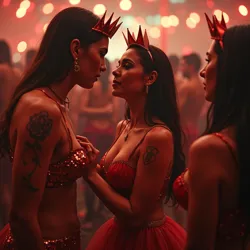Party Queen

Origins and Creation
The Party Queen emerged as the result of Dr. Malkinson's long-term experimentation on Cindy Reynolds, daughter of James Reynolds, throughout her time in the Backrooms. Through careful manipulation and controlled exposure to Liquid Pain and other Backrooms substances, Malkinson engineered Cindy's transformation into what he believed would be the perfect bridge between humanity and the Partygoers, creating a being capable of ruling both the Backrooms and Frontrooms.
The process of creating the Party Queen involved a complex combination of Almond Water, Cashew Water, and the mysterious Royal Rations, administered to Cindy over an extended period without her knowledge. This cocktail of substances fundamentally altered her consciousness, preparing her body and mind for the final catalyst: direct exposure to concentrated Party Punch during the Level 11 ballroom confrontation.
Physical Manifestation

Powers and Abilities
The Party Queen possesses unprecedented control over other Partygoers and the very fabric of the Backrooms itself. She can manipulate the physical structure of any level she occupies, bending architecture and altering room configurations at will. This ability plays a crucial role in the climactic chase sequence through Level 11 during the finale of City in the Rain.
Her most terrifying power lies in her ability to transform humans into Partygoers through touch alone, without the need for Party Punch. This ability is demonstrated in the devastating sequence where she transforms several M.E.G. officers while desperately fighting against her own actions, highlighting the internal struggle between Cindy's consciousness and the Party Queen entity.
Psychological Impact
The Party Queen represents a unique form of psychological horror within the trilogy, as she retains full awareness of her actions while being unable to prevent them. This duality creates some of the most emotionally charged scenes in the series, particularly during her final confrontation with Maria Diaz, where she briefly regains control long enough to beg for death rather than continue existing as Malkinson's creation.
The character's impact on audiences was profound, with many viewers and critics noting how the Party Queen subverted traditional body horror tropes by maintaining the victim's consciousness throughout the transformation. The sequence where she recognizes Maria but cannot stop herself from attacking her is often cited as one of modern horror's most psychologically devastating scenes.
Cultural Impact
The Party Queen has become an iconic figure in horror cinema, inspiring numerous academic papers on the nature of consciousness and identity. The character's design has influenced fashion and art, with several high-profile designers creating collections inspired by her distinctive appearance. The transformation sequence won multiple technical and special effects awards, setting new standards for practical effects in horror films.
Legacy
Following the release of City in the Rain, the Party Queen became a symbol of tragic metamorphosis in horror literature and film. The character's influence can be seen in numerous subsequent works dealing with themes of identity loss and forced transformation. The Party Queen Protocol, a term coined by the M.E.G. in the film's universe, has entered popular culture as shorthand for situations where someone must harm those they love for a greater purpose.
See Also
- The Backrooms Trilogy
- Dr. Arnold Malkinson
- Level 11
- Party Queen Protocol
- Partygoer Evolution Theory
References
- Goldman, J. (2028). "The Metaphysics of Transformation in The Backrooms Trilogy"
- Aster, A. (2028). "Director's Commentary: City in the Rain"
- Myers, E. (2029). "Living with the Queen: My Experience Portraying Cindy's Transformation"
- "The Art of the Backrooms: Design Documents and Concept Art" (2028)
- "Practical Effects in Modern Horror: The Making of the Party Queen" (2028)